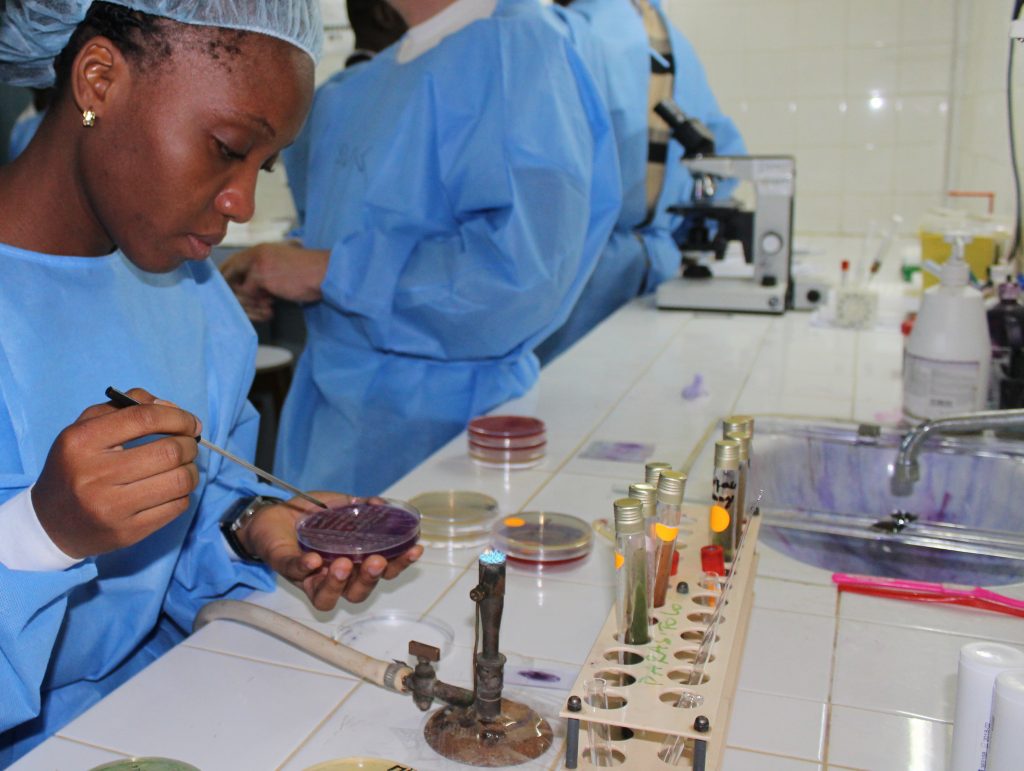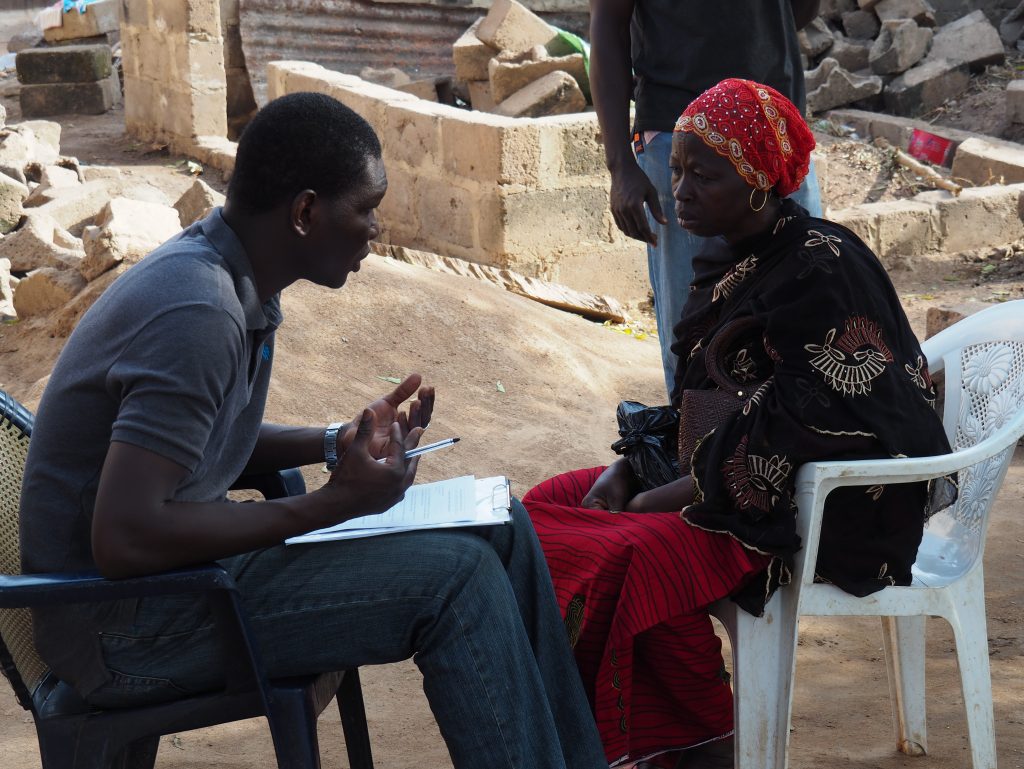News
# IPC Training in DRC
From September 20th – 24th 2021, ANDEMIA, the INRB, and Saint Luc Hospital collaborated to provide a 5-day training in the WHO core components of a facility infection, prevention and control (IPC) program. The training was led by an external IPC expert, Dr. Charles Basilubo, with support from Dr. Francois Kangela, an internal IPC expert. The 23 participants of the training were healthcare workers and other IPC stakeholders from Saint Luc Hospital, the INRB, and the Kisantu Health Zone.
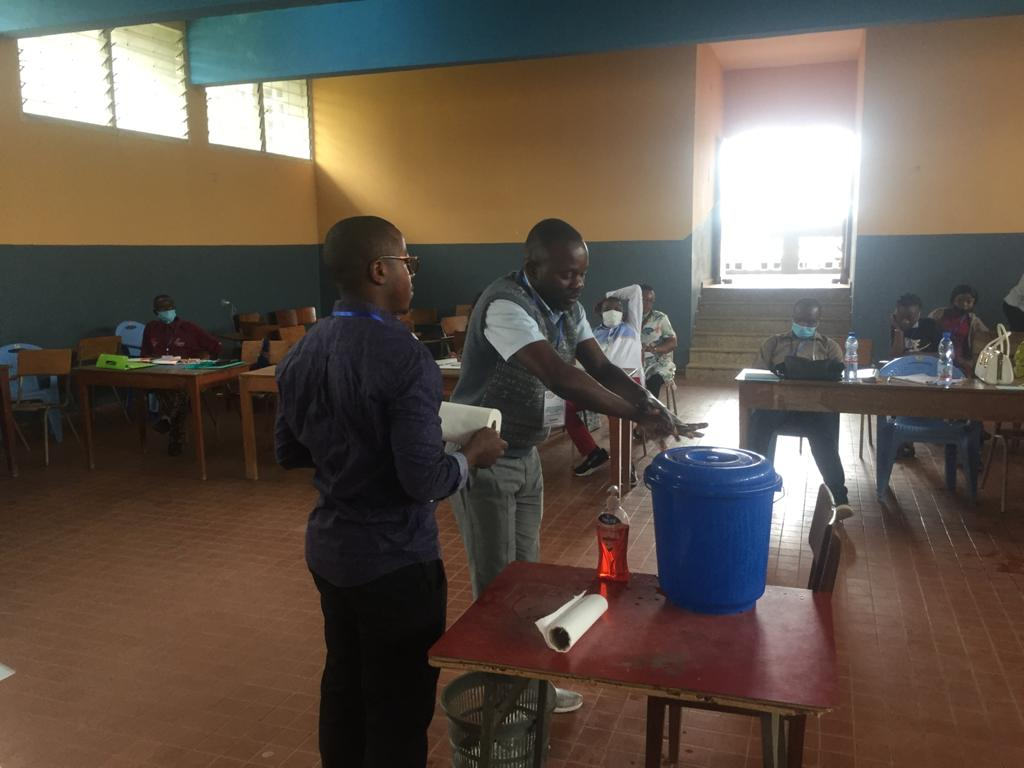
News
# Site visit – Sequencing training at CHU
From March 7–28 and June 6–19 of 2021, Grit Schubert and Rebekah Wood from the RKI traveled to the Central University Hospital (CHU) of Bouaké for training, diagnostics and team building. Dr. Schubert conducted a repeated training in MinION nanopore sequencing of SARS-CoV-2 as well as in bioinformatical analyses with the ARTIC Pipeline. Both trainings were performed at CHU Bouaké together with the local network members. Results of sequencing and analysis were published in a preprint (https://www.medrxiv.org/content/10.1101/2021.05.06.21256282v1) after detection of a variant of concern. Dr. Schubert and Mrs. Wood also supported the local team in SARS-CoV-2 serological analyses, molecular diagnostics for the surveillance network and student training. There was also time to visit and consult with the medical staff at the Brobo health center. The new laboratory building was inspected on each trip and there is a lot of excitement that the facility is getting closer to an operational point. The information exchange has been very fruitful and continues on with members of the CHU diagnostic team coming to Berlin for further training this August.
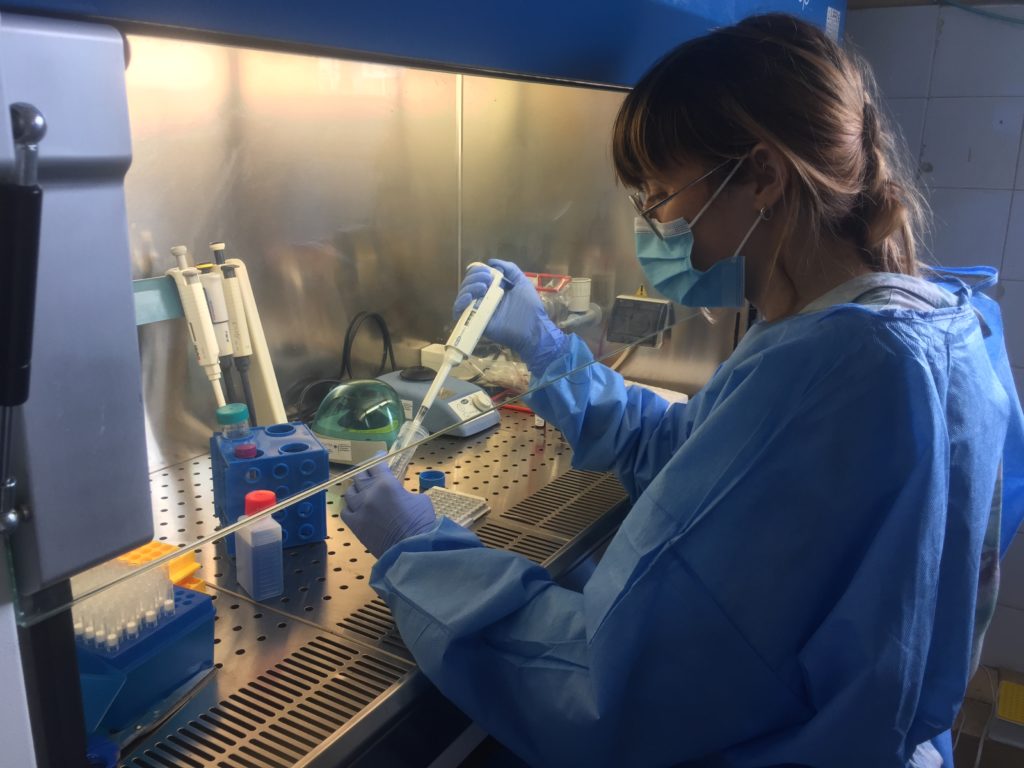
News
# Mobile sequencing training in Burkina Faso
In October and November 2020, a laboratory training on molecular SARS-CoV-2 diagnostics using PCR and Elisa, as well as mobile sequencing using MinION (Oxford Nanopore Technology) took place at Centre Muraz in Bobo Dioulasso in Burkina Faso, conducted by Essia Belarbi (P3/RKI) und Jasmin Schlotterbeck (FG37/RKI).
During the almost 5-week stay, they conducted a workshop on the basics of genome sequencing. Together with the Burkinabe team led by Dr. Arsene Zongo they tested sample material routinely collected from probands via ANDEMIA since the beginning of the 2019 pandemic and sequenced a total of 85 SARS CoV-2 positive samples, predominantly from the national coronavirus surveillance. During the stay, the sequence data generated was published as the first Burkinabe SARS CoV-2 sequences via “GISAID” which is an online database that enables the rapid publication and international exchange of genome data in outbreak situations.
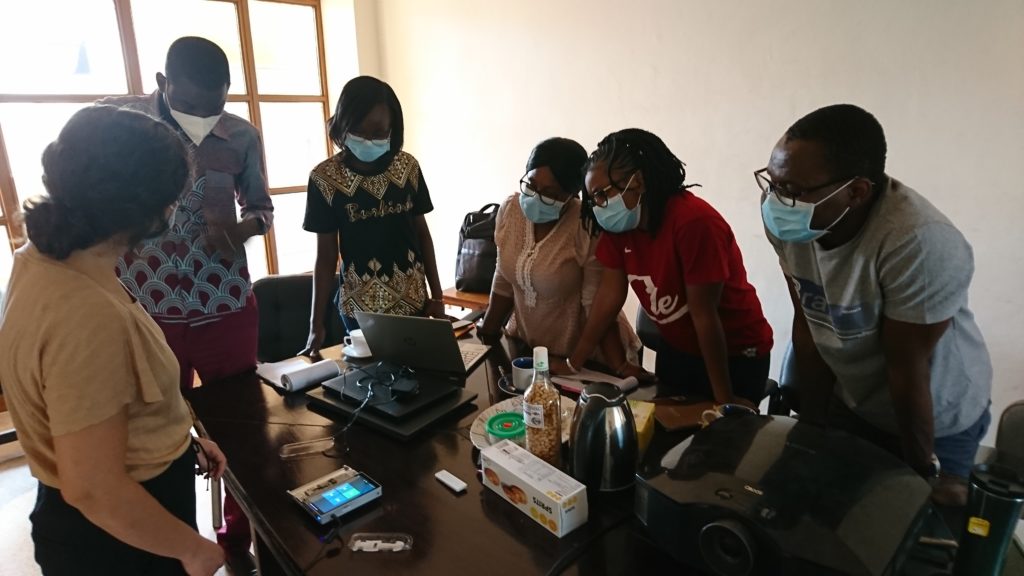
News
# 5th ANDEMIA network meeting
Due to the pandemic, this year’s meeting of the ANDEMIA network could only take place online and in a shortened form. On 24 November 2020, the project partners from the four African partner countries met online to digitally exchange information about project progress despite the corona impairments and plans for the future of the project. The respective syndromes were discussed like in previous years in plenary as well as subgroup discussions.
Besides the ANDEMIA activities project members also discussed the national SARS-CoV 2 activities they are involved in.
Even despite the shortness of this year’s meeting we had very fruitful discussions and hope to meet again in person in 2021.
Stay healthy!
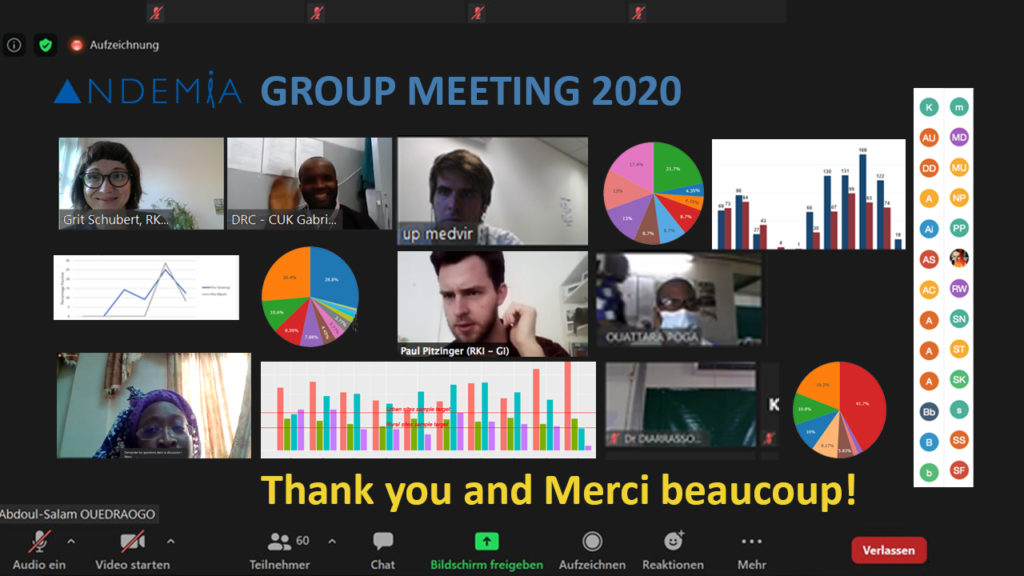
News
# Mobile sequencing of SARS-CoV-2 in Côte d’Ivoire
From 22.09. – 11.10. 2020 Andreas Sachse (P3/RKI) held a 3-week laboratory training course on molecular SARS-CoV-2 diagnostics, especially on mobile sequencing using MinION (Oxford Nanopore Technology) at the University Hospital CHU Bouaké in the Ivory Coast in order to provide specific support for Ivorian colleagues in the current pandemic.
During the stay Mr. Sachse sequenced together with the Ivorian scientist Etile Anoh a total of 208 samples, mainly from the national Coronavirus Surveillance. During Mr. Sachse’s stay, 64 sequences have been generated so far and these are the first Ivorian SARS-CoV-2 sequence data made available to the public via GISAID. GISAID is an online platform that allows for the rapid international exchange of genomic data, including SARS-CoV-2. At the same time, 7 SARS-CoV-2 full genomes of patients of the BMBF-funded ANDEMIA study from the Democratic Republic of Congo (report September 2020) could be published on the same platform.

News
# Training in SARS-CoV-2 diagnostics and serology at INRB, Kinshasa
In order to support the Congolese colleagues in the current pandemic, a laboratory training in molecular SARS-CoV-2 diagnostics and serology took place at the INRB in Kinshasa.
During a 3-week stay (05.-28.08.2020), Caroline Röthemeier from RKI, Germany and the Congolese ANDEMIA team examined sample material that had been routinely collected from ANDEMIA participants since December 2019. RNA was extracted from over 600 nasal/pharyngeal swabs from patients with acute respiratory symptoms and tested for SARS-CoV-2. In addition, 480 serum samples were serologically tested for the presence of long-term antibodies (IgG) against SARS-CoV-2. Seropositive samples will now be tested by neutralization test at the RKI.
The local staff trained by Ms. Röthemeier is now also responsible for the analysis within a SARS-CoV-2 antibody study among health care workers and their families in Kinshasa. This study is carried out in cooperation between the RKI, the INRB/Kinshasa, the ITM/Antwerp and the IRD/Montpellier.
This training was financially and organizationally supported by the GHPP project ARGOS and ZIG3/RKI respectively.
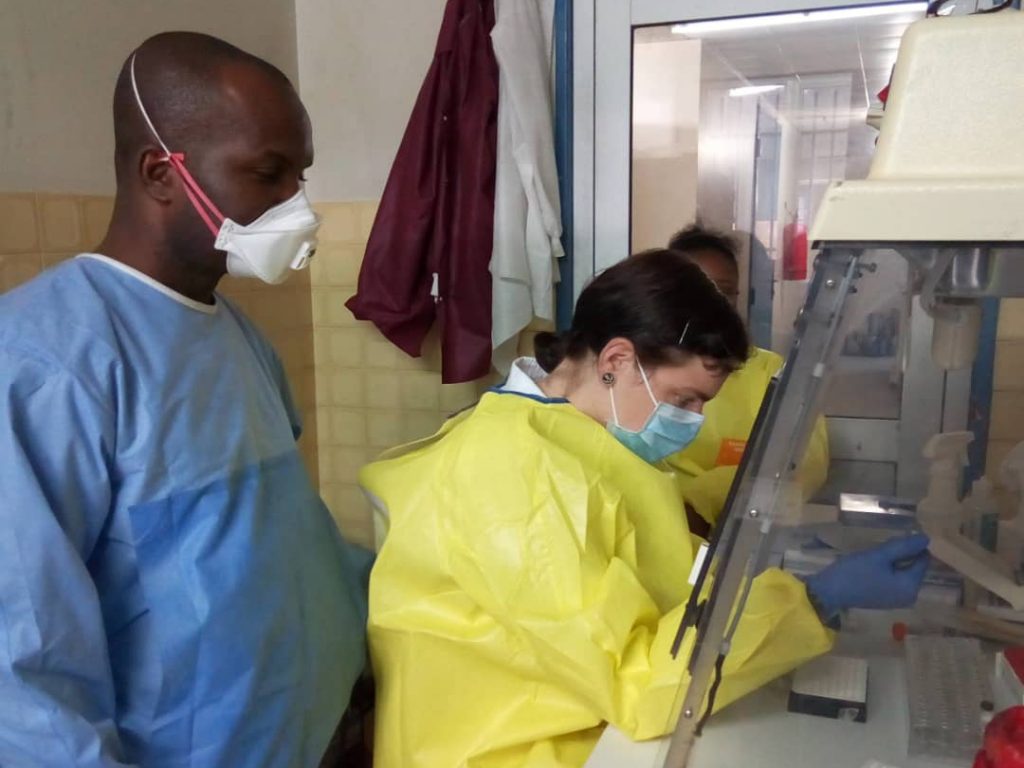
News
# ANDEMIA and COVID-19
SARS-CoV-2 is widely spreading throughout the African continent, and with a focus on also acute respiratory disease, ANDEMIA is highly engaged in supporting our African partner countries in responding to the pandemic.
We therefore included SARS-CoV-2 PCR in our routine testing panel for all ANDEMIA patients (co-funded by BMBF through the sub-project ANCOS), implemented mobile sequencing techniques in order to investigate infection chains, and started a pilot serological survey to draw inference on the level of exposure of local populations to the virus.
Adding COVID-19 to the research program of ANDEMIA will aid to close important knowledge gaps in the understanding of COVID-19 disease dynamics and epidemiology, provides a platform for long-term monitoring of COVID-19 pneumonia, and most importantly practically assists in national COVID-19 control efforts, which is of utmost importance.
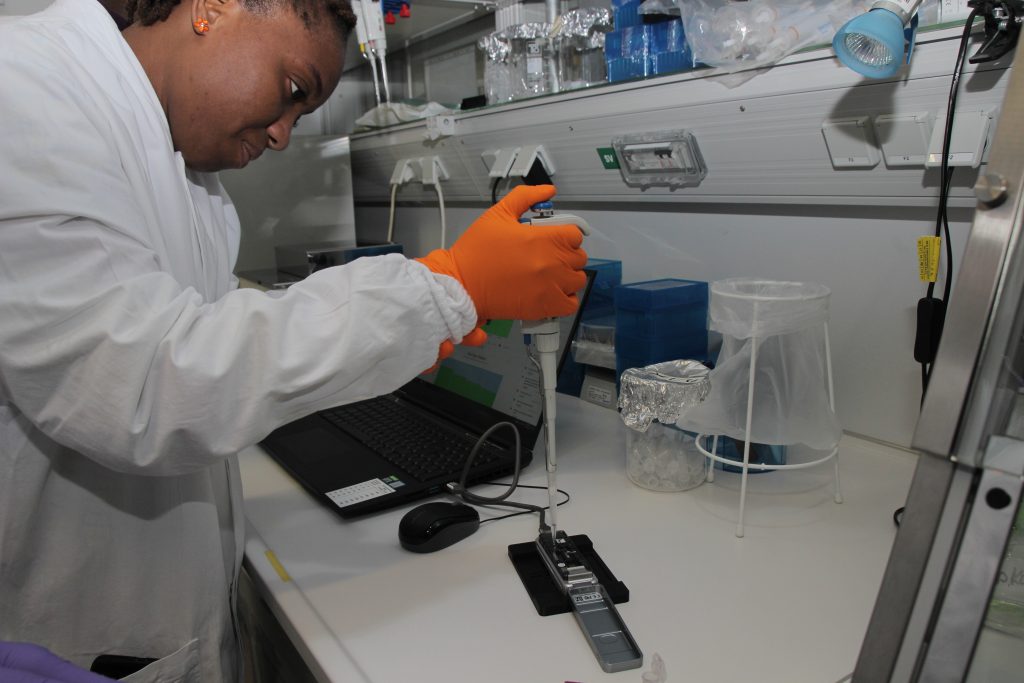
News
# Laboratory refresher training and launch of healthy control enrolment, BF
From the 24.02. to 08.03.2020 three members of the German ANDEMIA team from RKI spent two weeks at the partner site “Centre Muraz” and “Centre Hospitalier Universitaire Souro Sanou” at Bobo-Dioulasso in Burkina Faso.
As the previous stay in Côte d’Ivoire the main focus of the trip was retraining of enrolment staff and quality assurance in laboratory practices. This included pre-analytics such as proper blood sampling procedures and avoiding contamination in blood culture (training video), as well as individual training and reassessment of laboratory practices in both molecular and bacteriological testing. On the molecular testing side, the validation of results was re-evaluated and focused on. On the bacteriological side, the team from RKI emphasized the use of API galleries for bacteria identification with an introduction to the APIweb system. Lastly, several meetings for the start of enrolment of healthy controls were organized to discuss last organizational questions and to successfully launch enrolment in Burkina Faso.
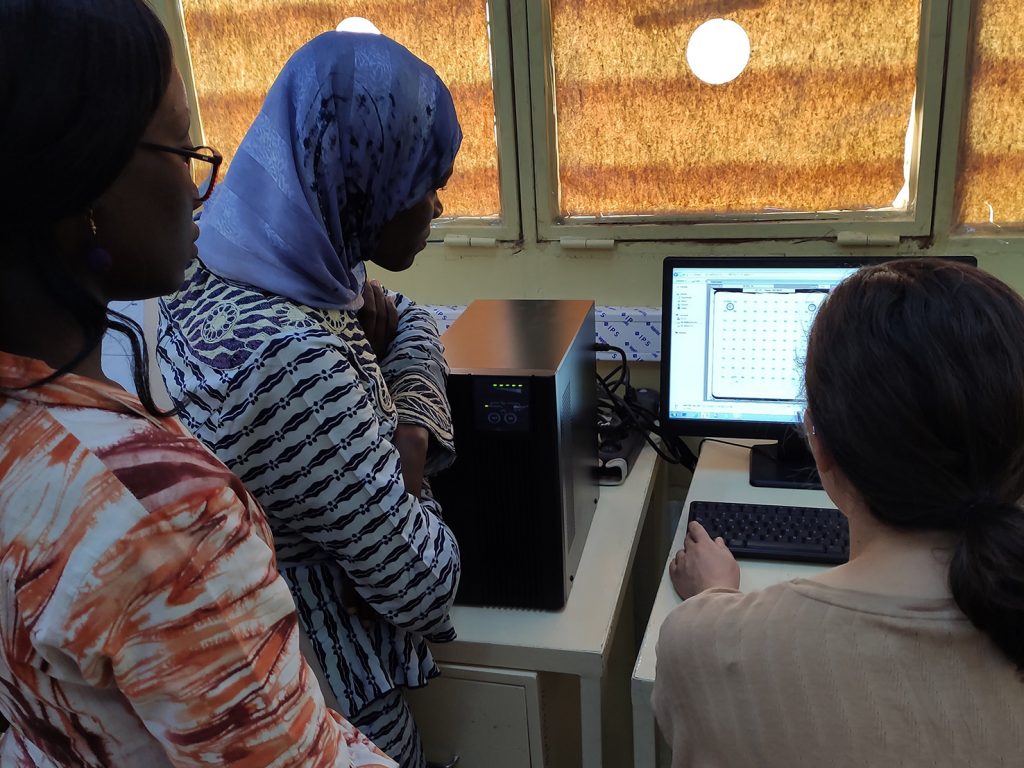
News
# Laboratory refresher training and launch of healthy control enrolment, CIV
From the 14th of January to the 13th of February 2020 Essia Belarbi and Paul Pitzinger from the german ANDEMIA team visited all study sites in Côte d’Ivoire to re-train laboratory staff in bacteriological and molecular laboratory processes and to implement the enrolment of healthy controls at the different sites.
Health care workers received a refresher training in aseptic blood sampling in order to reduce contamination rates in blood culture, which was supported by a short training video, provided by ANDEMIA and the ITM Antwerp. This video can be accessed freely on the internet here and should be used by the partners to either train new personnel or to remind established health care workers on the proper techniques.
To further improve the quality of bacteriological results biologists and technicians of the bacteriology labs in Bouaké and Guiglo were trained in the use of the API®(Analytical Profile Index) system. Lastly, the implementation of healthy control enrolment was presented to all study sites. As this phase is crucial for the further analysis and interpretation of results, the protocol was discussed in detail to make sure that every site is familiar with procedures and can start enrolment.
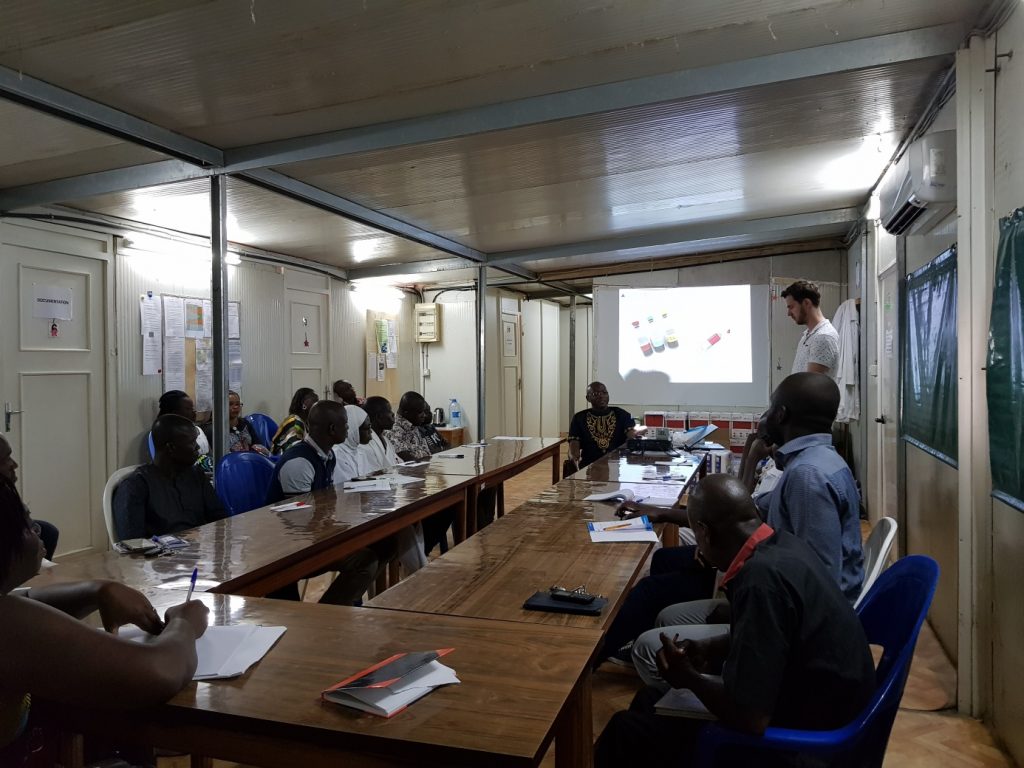
News
# Mid-term meeting in Accra, Ghana from 28-31 January 2020
From 28th to 31st of January 2020 members of the ANDEMIA team attended the “Research Network for Health Innovations in Sub Saharan Africa mid-term meeting” in Accra, Ghana. During several workshops and panel discussions African and German scientists from all of the five networks came together to discuss global health questions and to exchange experiences regarding cross-project topics. Project specific issues were discussed in internal network meetings

News
# 4th Network meeting in Berlin, Germany
The fourth ANDEMIA network meeting took place in Berlin from 18th to 22nd November 2019. Project partners from the four African partner countries met at the Robert Koch Institute to discuss progress, problems and plans for the future of ANDEMIA. Of course, employees of the BMG-funded GHPP projects TRICE and ARGOS, which are closely linked to ANDEMIA, were also invited to exchange information with joint project partners. One of the main objectives of this year’s meeting was to plan targeted data analyses and to develop a publication plan.
In the run-up to our network meeting, three workshops for ANDEMIA Master and PhD students, as well as project staff of ARGOS and TRICE, took place:
A workshop on “Proposal writing”, aimed at enabling students to write structured project proposals. In the workshop “Data reporting”, the participants were instructed in compiling and evaluating data from the ANDEMIA database. In the third workshop the participants gained insight into mobile sequencing using MinION technology, which is to be established in the partner countries as an additional diagnostic tool.

Workshop
# Workshop on data quality in Côte d’Ivoire, 15 to 28 June 2019
A two-week workshop was held at the Centre Hospitalier Universitaire in Bouaké from 15 to 28 June 2019 in collaboration with Prof. Chantal Akoua-Koffi to improve the quality of data on bacterial identification and antimicrobial resistance (AMR) as well as the general epidemiological collection and analysis of data. The training was aimed at study team members from ANDEMIA and the BMG funded GHPP project ARGOS. Various members of the Cote d’Ivoire study team participated in the workshop as well as two participants from Burkina Faso and the Democratic Republic of Congo who travelled to take part in the meeting. Two participants from RKI, Germany also helped to facilitate the workshop, which was sponsored by funds from the Global Health Protection Programme of the German Ministry of Health.
Bacteriology and AMR testing SOPs were reviewed together in detail, revised and harmonised according to international standards and laboratory practice in each of the study countries. A laboratory risk evaluation was conducted and the results were used to create a quality control plan with concrete objectives, timing and criteria. A training was given on WHONET and a template was practically developed to record and analyse ongoing results of the quality control activities. Lastly, a plan was made for next steps in the following six months to improve the exchange on results of bacteriology and AMR testing in the network.
To improve overall quality of epidemiological data collection, a new reporting process was discussed with all countries including a validation process of all past data and ongoing weekly data management reports to more effectively detect and correct errors in data collection and management. Future possibilities for regular teleconferences or online training were also discussed.
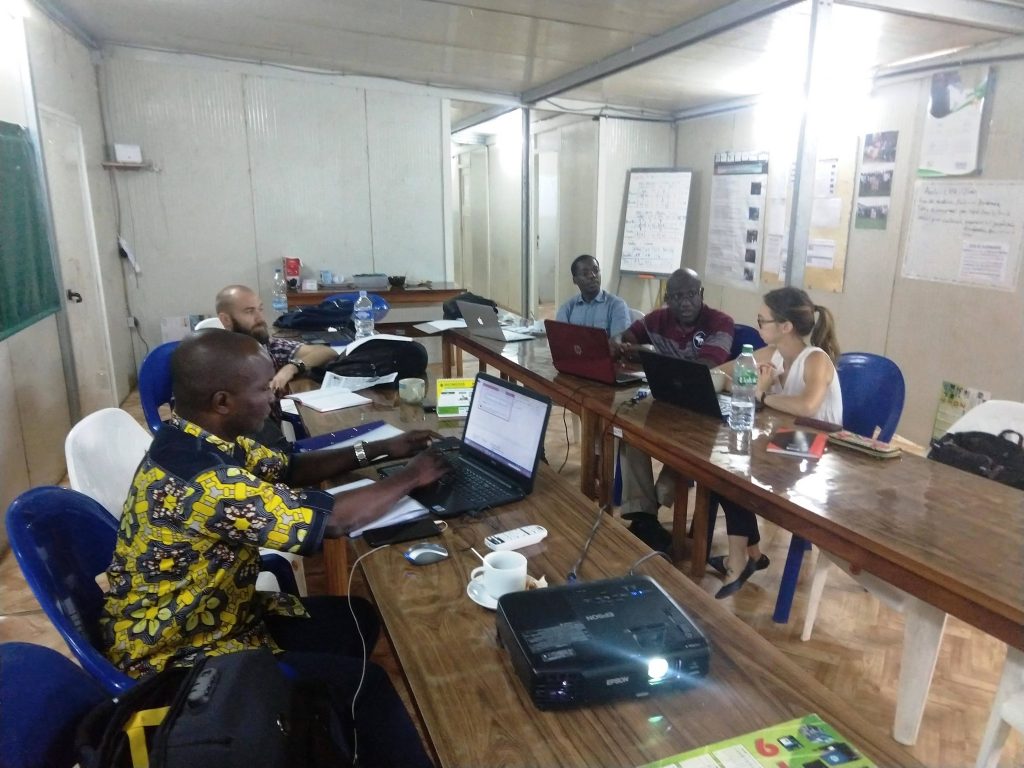
Workshop
# Statistical & molecular workshop in Southafrica, 7th May – 6th June 2019
A course in „Advanced Epidemiology and Statistics“ was held at the National Institute for Communicable Diseases (NICD) in Johannesburg from the 7th to the 23rd of May 2019. The course was taught by Dr. Matthias Borchert (RKI Berlin). Overall 14 participants from DRC, Burkina Faso, Côte d’Ivoire, Sierra Leone, Guinea and South-Africa took part in the 15-day course to learn and apply hands-on advanced statistical methods used in epidemiology, including regression analysis, advanced data management and analysis of case-control studies. The contents were conveyed during lectures, interactive and group sessions as well as an assignment and written examination component.
Directly afterwards, from 27th May until 6th June 2019 a second workshop on the topic „Molecular Biology“ was given at NICD, organised by our colleagues from UP and NICD. In total 9 candidates from all 4 ANDEMIA countries participated in the workshop.
During a hands-on training the participants processed human clinical specimen of ANDEMIA patients of South Africa and isolated strains or controls. The scope of the training was to improve skills in the molecular techniques for each of the 3 ANDEMIA syndromes, such as multiplex real-time PCR and application of a macroarray, as well as good laboratory practice, interpretation of results, data storage and quality control.

News
# 3rd Network meeting in Burkina Faso
Our third network meeting was held from 19th-23th of November 2018 at the Centre Muraz in Bobo-Dioulasso, Burkina Faso. All partners presented preliminary results and discussed both scientific questions and organizational, logistical and content-related difficulties and possible solutions. Additionally the entire 23 master and Phd-students enrolled in the ANDEMIA training program presented their projects.
Key network target of the meeting was improving enrolment numbers and data quality across all sites and strengthening of the bacterial diagnostic capacities in the partnering countries.
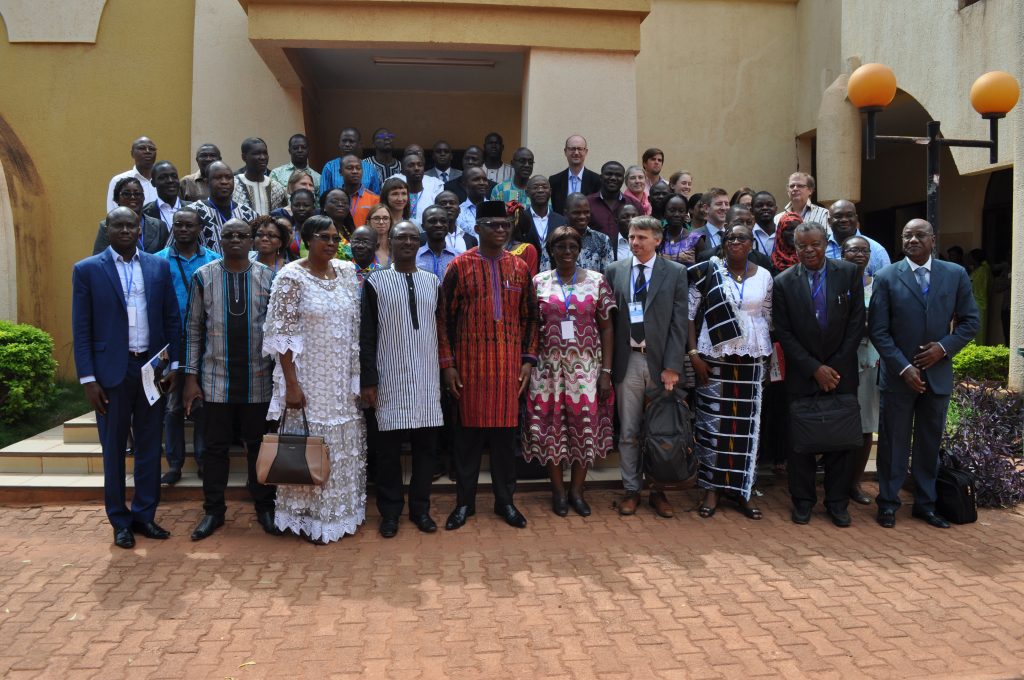
Workshop
# Workshop “Molecular diagnostics” in Berlin
In cooperation with the Global Health Protection Programme we invited three ANDEMIA students from Côte d’Ivoire, Burkina Faso and Democratic Republic of Congo to a 2-months (03.09.2018 to 26.10.2018 ) intensive workshop on molecular diagnostics in Berlin.
In addition to various tools for molecular diagnostics, the workshop also included the correct documentation of data, interpretation of results, troubleshooting, quality management and theoretical introductory courses in next generation sequencing. Additionally our students were able to participate in an intensive English course, which was particularly important for our students from french-speaking countries.
The workshop will be followed by intensive training sessions in the partner countries under the direction of Dr. Essia Belarbi, who is responsible for molecular diagnostics. The aim is to implement what has been learned in each of the countries and to ensure a good and sustainable application of the learned methods as well as the transfer of the knowledge to other key persons. In addition, a shorter, more specific workshop on molecular diagnostics at the University of Pretoria is planned for May/June 2019 in South Africa.
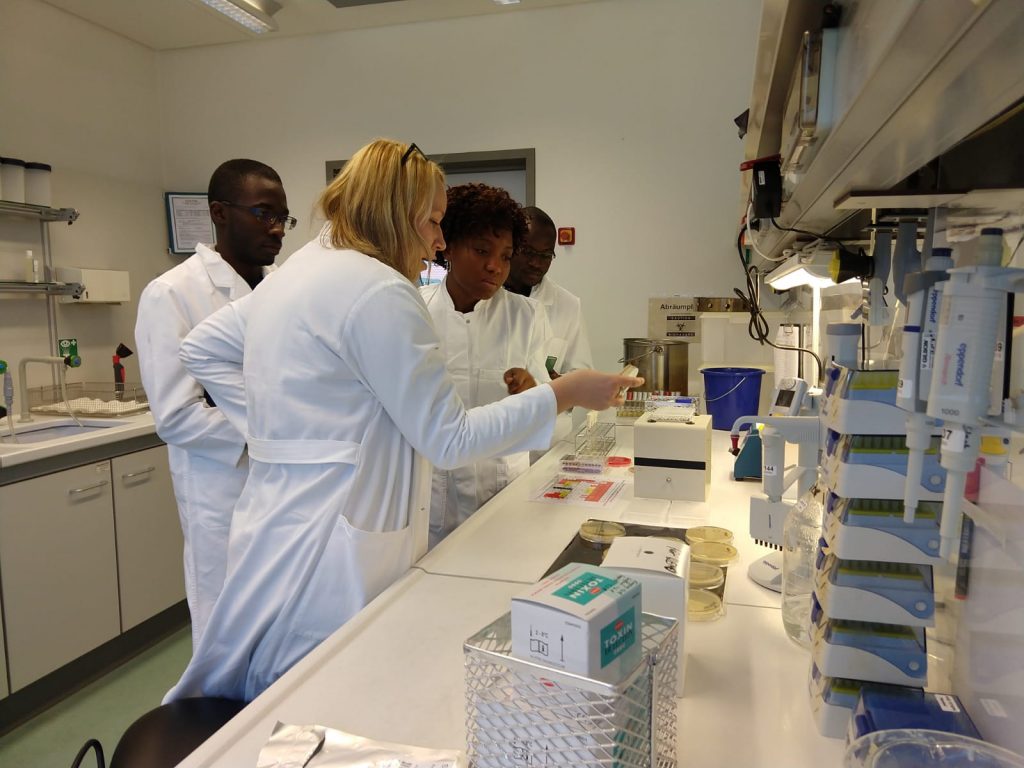
News
# Site visits in Guiglo and Tai, Côte d’Ivoire in 2018
Since 2017 the Centre Hospitalier Regional (CHR) Guiglo in Côte d’Ivoire is better supplied with bacteriological laboratory diagnostics capacities (see report “Laboratory set up Guiglo”). Due to this expansion of lab capacity, further diagnostics can now also be offered in the Centre de Sante Rural (CSR) in Tai, a small rural hospital near the Tai National Park at a distance of ca. 80km from Guiglo.
The CHR Guiglo and the Centre Hospitalier Universitaire (CHU) in Bouaké have been in constant training exchange to establish the necessary methodology and workflows in the laboratory. For this purpose, several training exchanges have been organized since mid-2017, during which laboratory staff from Guiglo was trained for several weeks in Bouaké as well as experienced staff from Bouaké accompanied the work in the bacteroiology lab in Guiglo. In April, May and July 2018 Prof. Chantal Akoua-Koffi and Dr. Abdulaye Diarrasouba (Postdoc) organized several visits to Guiglo and Tai against the background of establishing work processes in diagnostic stewardship in close cooperation with local personnel. This included the correct sampling of patients, sample storage and diagnostic processing in Guiglo as well as the safe transport of samples for further analysis from Tai to Guiglo and from Guiglo to Bouaké respectively.
Through the project and training activities, conveyed by local expertise, not only the cooperation between the hospitals but also the internal working methods within the hospitals have improved. Medical and laboratory personnel at CHR Guiglo now meet every two weeks to coordinate their activities, discuss innovations and problems concerning the projects as well as the hospital routine. A similar development had already taken place at CHU Bouaké, where representatives from all services meet with laboratory personnel on a monthly basis. It has been shown that within these meetings, in addition to project-relevant topics, a general exchange takes place. Developments of this kind can contribute to a sustainable improvement of communication even after the end of the project and thus to the early detection of problems and their management.
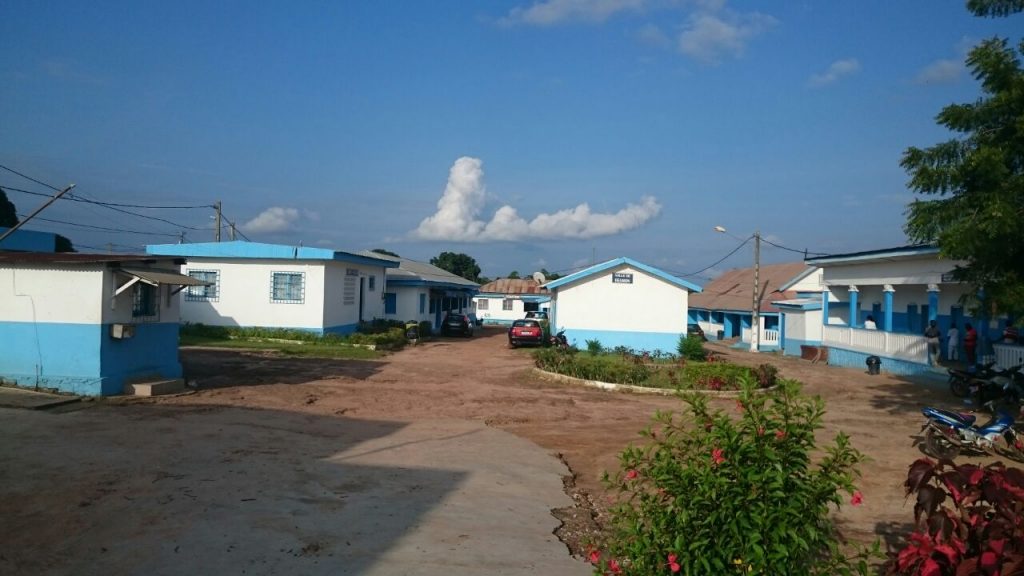
News
# Second network meeting in Côte d’Ivoire
Our second network meeting was successfully held at the University hospital Bouaké in Côte d’Ivoire, the site of the ANDEMIA coordinator Prof. Chantal Akoua-Koffi. For this, all countries’ ANDEMIA teams got together to discuss progress and new research directions of the project.
The next meeting will be held at Burkina Faso in November 2018.
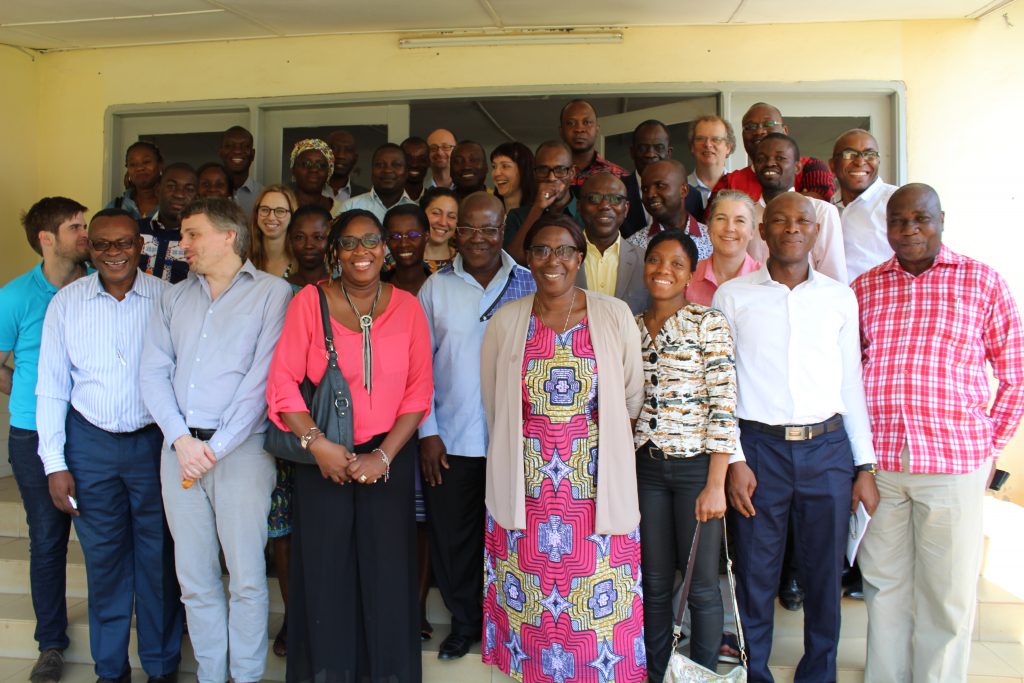
News
# Launch of ANDEMIA at Burkina Faso
We introduced ANDEMIA to medical and scientific staff involved at the University hospital Sourou Sanou and the Centre Muraz at Bobo-Dioulasso, Burkina Faso. Right after, the first patients were being enrolled for our study on the causes of acute respiratory, gestrointestinal and febrile illness.

News
# Launch of ANDEMIA at Côte d’Ivoire
With an introductory workshop on ANDEMIA methods and protocols, active syndromic surveillance of acute respiratory, gastrointestinal and febrile disease was initiated at the first ANDEMIA sites in Côte d’Ivoire – University hospital Bouaké and Rural health center Brobo.
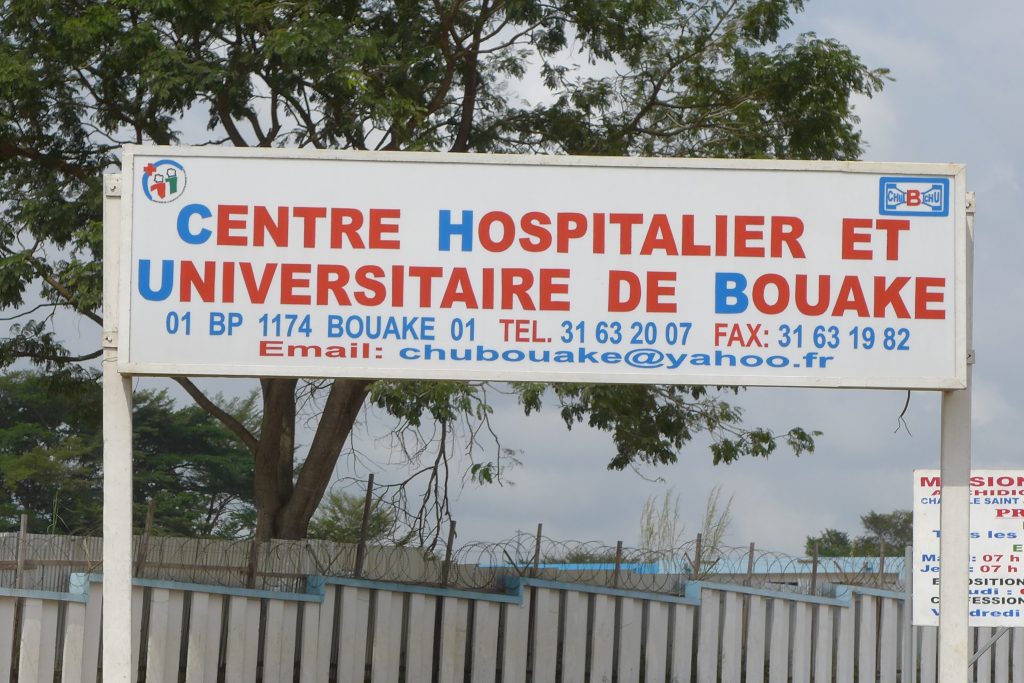
Workshop
Laboratory Diagnostics – Bacteriology, Blood culture and AMR
In preparation of the launch of ANDEMIA at Côte d’Ivoire, we organized a workshop aiming to equip the two urban sites in Bouaké and Guiglo with necessary expertise and diagnostic capacities in bacteriology, with a focus on blood culture and AMR-surveillance. This workshop was funded by the Global Health Program of the Federal Ministry of Health of Germany. The scope of the training was to improve pre-analytic routines (sampling, transport logistics, preparation of culture media), implement a half-automated blood culture system (BacT/Alert) in Bouaké, teach bacteriological identification techniques, antimicrobial susceptibility testing and to interpretat antimicrobial susceptibility tests using EUCAST-breakpoints.
News
# Preparation of sentinel site in Guiglo, CIV
One of the ANDEMIA sentinel sites is Guiglo, a small city of about 114.000 inhabitants in the western part of Côte d’Ivoire, at a distance from Bouaké of about 400km. The local Centre Hospitalier Regional (CHR) is one of the rare hospitals in the western part of the country with a catchment area of about 30.000 km² and a consultation rate of about 25.000 patients per year. To date lab diagnostics is limited to Malaria, HIV and microscopy of parasites. Bacteriological diagnostics was not possible so far.
The reconstruction and extension of the existing rooms established the basic conditions for the implementation of the microbiological diagnostics. Construction began in September 2016 and was already completed in November 2016. Essential equipment and laboratory materials have been purchased and set-up as well. With the implementation of bacteriological diagnostics CHR Guiglo now is well suited to serve as a sentinel site for the ANDEMIA project. Reconstruction and equipment was funded by the Federal Ministry of Health (Global Health Protection Programme, project ARGOS).
Next step will be a training of laboratory technicians from the CHR Guiglo in microbiological laboratory techniques to enable them to run essential diagnostics. A workshop focussing on blood culture and antimicrobial resistance testing is planned to take place in May 2017.
Workshop
Hands-on workshop “Field Epidemiology”
Our hands-on workshop “Field epidemiology” at Bouaké in Côte d’Ivoire equipped participants from all ANDEMIA partner countries with basic knowledge in epidemiological investigation and risk mapping, followed by a practical training at the example of Lassa virus, which has been demonstrated to occur in the northern part of Côte d’Ivoire.
Viral hemorrhagic fevers, such as Ebola or Lassa fever are responsible for disease outbreaks across West Africa and have a huge impact on human health, as demonstrated by the recent Ebola outbreak. Some of these viruses (e.g. Lassa virus) have their origin in wild animals e. g. rodents. Epidemiological skills as well as knowledge about the interplay of humans and animals are very important to determine high risk areas and to react in a timely manner in the event of an outbreak. This workshop was sponsored by funds from the Global Health Program of the German Ministry of Health.
